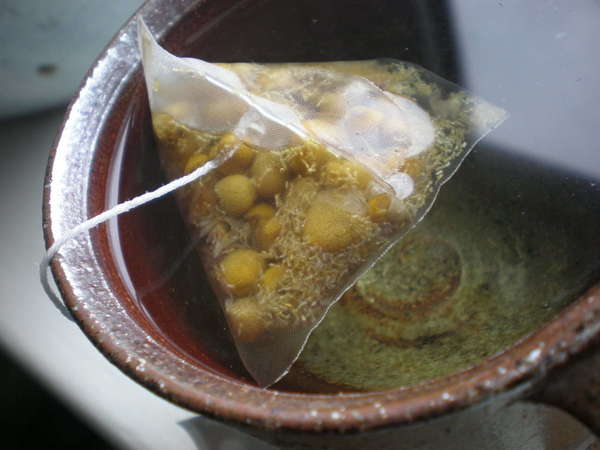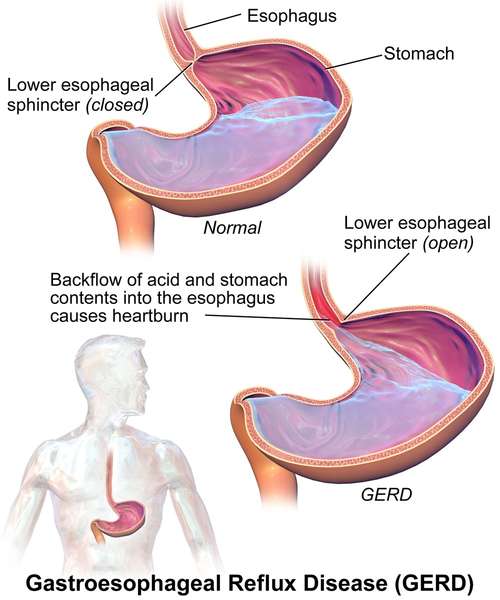Tea and Acid Reflux
Web: /ratetea.com/images/u/0e7a80f621500d9813bf84ddd6d64954-1280.jpg | Wikipedia: Gastroesophageal_reflux_diseaseLast Updated: Oct. 24, 2016Acid reflux, also called gastrooesophageal reflux (GERD), is a medical condition in which stomach acid comes up from the stomach into the esophagus. People often experience acid reflux as heartburn, a burning sensation in the chest, although the condition can also cause other symptoms.
People commonly worry or wonder if tea causes or aggravates acid reflux. Doctors and popular medical websites often target caffeine broadly, recommending people to reduce tea intake among other dietary changes. Usually these recommendations fail to distinguish between different caffeine sources such as tea, coffee, and soda. For example WebMD identifies caffeine in their list of top 10 heartburn (causing) foods, lumping tea and iced tea together with coffee and soda, but without citing any evidence that tea actually causes harm.
No evidence that tea causes or aggravates acid reflux
We searched the medical literature and found no evidence that tea causes, contributes to, or aggravates acid reflux. We found some evidence suggesting that it probably does not. Furthermore, there is some evidence that the connection to caffeine is spurious and that caffeine has been wrongly targeted due to association with coffee, and that coffee worsens GERD through ingredients other than caffeine.Tea is somewhat acidic, although much less so than coffee, and also less than most fruit juices. Although acidic foods are sometimes perceived to aggravate acid reflux, the acidity of tea is mild and is not enough to aggravate acid reflux on its own.
A 2004 case control study of thousands of people in Norway examined the effects of coffee and tea. In this study, tea was found to have no effect (positive or negative) on acid reflux.[1]
A 2005 study of over 7000 German adults, looking at a variety of lifestyle influences on GERD found no evidence that tea worsens acid reflux, instead identifying obesity and smoking as the major lifestyle factors.[2]
A 2007 control study compared tea, water, and coffee, and also examined the effect of adding or removing caffeine from each of these drinks, and concluded that coffee worsened acid reflux, but tea had a similar effect to drinking plain water. The study also observed that caffeine seemed to have no effect on acid reflux.[3] This study used plain black tea.
 Chamomile may reduce acid reflux, and may also promote relaxation which may produce indirect benefits. Photo © Maria Keays (Flickr), CC BY 2.0.
Chamomile may reduce acid reflux, and may also promote relaxation which may produce indirect benefits. Photo © Maria Keays (Flickr), CC BY 2.0.Herbal teas and acid reflux
As herbal teas are diverse and can be made out of many different plants, it is impossible to generalize about their effects, positive or negative, on acid reflux. Some herbal teas, such as hibiscus, can be highly acidic, but this does not necessarily mean that they will aggravate acid reflux. Other herbal teas can increase saliva production, which can help reduce stomach acidity.The Mayo Clinic identifies several herbs in their list of alternative medicine treatments for GERD, including licorice root, slippery elm, chamomile, and marshmallow root. Chamomile is a common ingredient in herbal tea blends, and licorice an occasional ingredient, usually in more medicinal teas.
Unfortunately, there is not much scientific research on the topic of common herbal teas either as a potential cause or potential treatment for this condition. There are some herbal preparations, however, which have shown promise for treating acid reflux. One is Rikkunshi-to, a Japanese blend of herbs combining atractylodes, lancea rhizome, ginseng, pinellia tuber, poria sclerotium, jujube, citrus unshiu peel, glycyrrhiza and ginger. This blend shows some evidence of reducing symptoms of acid reflux.[4]
If you have problems with acid reflux, you can use your own judgment and test which herbal teas seem to alleviate or worsen your symptoms.
Other natural treatments or protective factors
The German study of lifestyle factors found that physical activity and eating fruit both had a significant protective effect against GERD.[2] The Mayo Clinic also recommends relaxation techniques and acupuncture.References:
1. M. Nilsson et. al., Lifestyle related risk factors in the aetiology of gastro-oesophageal reflux, Gut., Vol. 53 No. 12, pp. 1730–1735, December 2004.
2. M. Nocon et. al., Lifestyle factors and symptoms of gastro-oesophageal reflux – a population-based study, Alimentary Pharmacology & Therapeutics, Vol. 23, No. 1, pp. 169-174, January 2006.
3. B. Wendl et. al., Effect of decaffeination of coffee or tea on gastro-oesophageal reflux, Alimentary Pharmacology & Therapeutics, Vol. 8, No. 3, pp. 283–287, June 1994.
4. H. Suzuki et. al., Japanese Herbal Medicine in Functional Gastrointestinal Disorders, Neurogastroenterol Motil. Vol. 21, No. 7, pp. 688-696, July 2009.
Further Reading:
Gastroesophageal reflux disease (Acid Reflux) - Wikipedia


